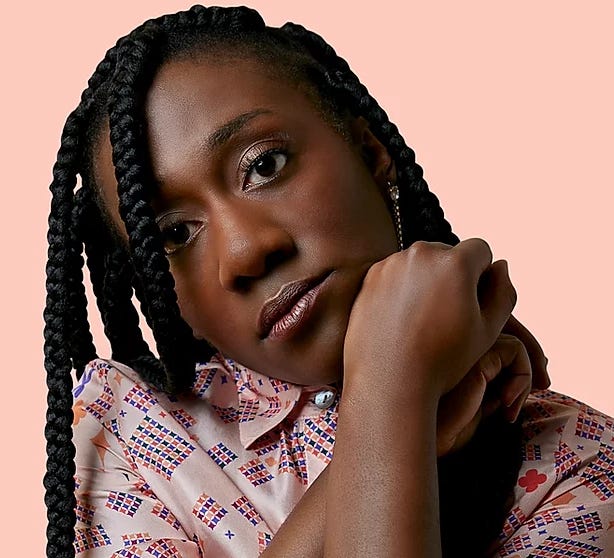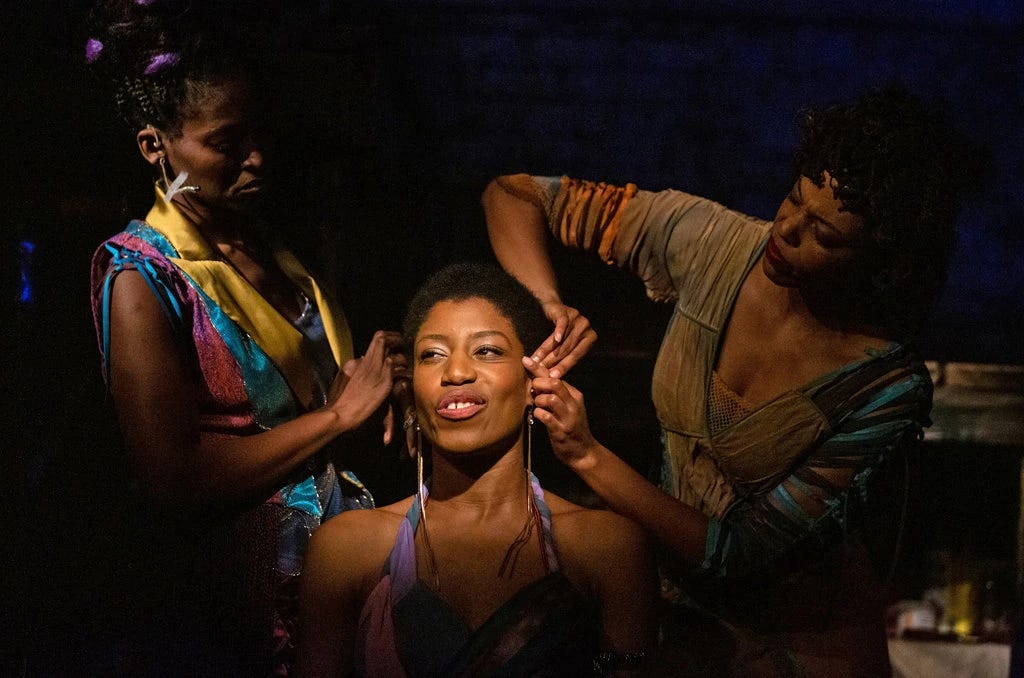"I have tried to delay the inevitable"
nicHi douglas dips a toe, hesitantly, into online theater
Choreographer, director, playwright, educator - though nicHi douglas prefers just “Maker.” Tonight, nicHi’s first online theater piece of quarantine goes live as part of Harlem9’s 48Hours in ™Harlem. A collection of six original works, 48Hours in ™Harlem has gone digital for its 10th anniversary. It is available here starting at 7pm tonight, through August 24th.
I caught up with nicHi about her work, the challenges of teaching movement on Zoom, the racial justice reckoning in the industry, and more.
This interview was conducted August 6, and has been edited and condensed for clarity.

Where are you in the process of creating your piece for Harlem9’s 48Hours in ™Harlem?
We’re editing our Zoom film shoots, stringing them together to make something theatrical. It’s a challenge, but I feel very honored to be called into the 48Hours world. To be honest, I have avoided the Zoom theater experiment thus far. I have tried to delay the inevitable. Theater online….uh, I think I don't know yet.
I'm someone who is so physical in their theater practice, so the surroundings became really important to me. So that’ll be my entry point for now - what’s the space, what are the environmental surroundings, and how does that inform the way a performance can happen?
In most online play readings they want you to ignore the space, ignore that apartment behind the actor. Or they’ll put a weird background, which can almost be more distracting. Whereas movement work demands we use the space, not ignore it.
Yeah - just to what you described about dropping a background in, that’s the conversation I'm having with the editor: “Can I get that background to have some movement to it? So it feels like we’re all in one space?” Even though we’re so clearly not.
Your focus in early quarantine was more on your teaching, right?
I teach at Tisch, and the pandemic hit right at the tail end of spring break. So I spent the first portion of shelter-in-place transitioning all of my embodied theater practices to a Zoom classroom. All of my reticence is because of the experience I had transitioning from teaching in class to teaching on Zoom.
I was in the process of guiding 28 juniors and seniors toward completing a fully realized in-person theater project. And the fear and panic that [those students] experienced...it wrecked them, it ruined them. And that also took a toll on me, and my faculty peers. It wiped us out.
How did that end up playing out - what shape did their projects take?
We were really proud of the students. Across the board. There were some incredible surprises and really bold choices made, especially by those who decided to shift gears and work in film. They pulled it together so quickly - like in four or five weeks.
And then there were some students who couldn’t, they couldn’t see through the challenge, they couldn’t figure it out. Which is completely fair. We tried to make abundantly clear to them that evaluation is like the least of anyone's concern. All of my students kept showing up on Zoom every time we had class, no matter what time zone they were in....God. It’s so painful.
They have grown and persevered in a way I didn't ever have to when I was their age. The two or three classes of university level students that are traversing this strange moment for embodied art practice - I'm already impressed by their fortitude.
What has hit you most strongly in this moment of racial justice reckoning for the theater industry?
It’s a little bit exhausting, and a little bit...boring? If I can be frank. Because I have been Black this whole time. So it’s 2020 and now you would like to have, I don’t know, facilitated conversations with your admin and board? Like, okay great, you do that.
I have difficulty with the sense of urgency surrounding it now, and I have difficulty with the fact that the urgency is rooted in Black death. It’s a little bit shameful.
In your own work, correct me if I’m wrong, you have tried to center Black joy in your work. Is that what comes into your head when you mention the centering of Black death in the current reckoning?
I think I’m just trying to pinpoint the reality that whiteness often tries to account for itself. Or whiteness only operates in reaction to, as opposed to proactively seeking liberation and justice. So this anti-racist moment in the theater industry that’s rooted in Black death, in the death of George Floyd, it’s reactive. And that’s why I don’t trust it.
My work centers Black women and femmes’ experiences, period. The idea that Black joy is central to my work is only true if, in the next breath, you say that Black death is central to my work. It's the whole Black experience. I don't think it serves anyone to block out any parts of Black life in storytelling. I hold space for the full spectrum of lived experiences of Black women and femmes. And that's often joyful, and also sorrowful.
What might you hope for going forward in terms of making space for those narratives that you’ve always centered?
I would hope to see a more integrated approach to building seasons. Developing audiences more so that we understand - if an audience is all white, of course they want to see white plays, but if audiences can be developed and diversified, then perhaps we’ll understand that a wider array of stories are necessary to represent New York City's communities.

SKiNFoLK: An American Show at the Bushwick Starr (photo: Maria Baranova)
You received an Antonyo nomination as choreographer of SKiNFoLK: An American Show, which closed early at the Bushwick Starr due to the shutdown. How did that feel?
I was so thrilled and mindblown to be nominated for an Antonyo. I didn’t realize that really anyone knew who I was! So it really was very exciting, and so humbling. I don't think I'll ever forget it.
Working on SKiNFoLK was a very special experience because of the intimacy of the production, and because of the way [director] Jillian Walker operates. We both share a feeling about our theater practice being a spiritual practice. It was really great to have that shared culture.
There were so many other productions that didn’t even get to see the full light of day, so I am thankful for the closure of [the shutdown] at least coming at the tail end of our run.
What’s next for you? What is the status of BK Play, your collective with facilitates imaginative play for children 2-10? I know you hope to open it as a brick and mortar.
I hope to get BK Play off the ground. Something about starting a business a couple of years ago felt really overwhelming to me, because of the scale. But right now things have to be small.
I was supposed to go into production at a big Off-Broadway theater this fall. That show’s indefinite postponement is so heartbreaking, and really feels like it’s thrown my career off track. [I can’t name the show], which has felt incredibly complicated in this moment of holding theaters accountable to possibly racist or discriminatory actions.
I have mentioned to the theater that it has felt incredibly silencing to not be allowed to publicly share my dismay about the postponement of that production, and I’ve been met with such red tape about what their rules are, how they announce their season, how it's about them and how they will look. It’s so painful. So that’s something I’m carrying in this moment.



